www.aljazeerah.info
News, August 2008
Archives
Mission & Name
Conflict Terminology
Editorials
Gaza Holocaust
Gulf War
Isdood
Islam
News
News Photos
Opinion Editorials
US Foreign Policy (Dr. El-Najjar's Articles)
www.aljazeerah.info
|
Editorial Note: The following news reports are summaries from original sources. They may also include corrections of Arabic names and political terminology. Comments are in parentheses. |
Russia Recognizes Abkhazian & South Ossetian Independence, Opening File of the World's Unrecognized States
Russia recognises Abkhazian & South Ossetian independence
Russia Today, August 27, 2008, 0:54
Russian President Dmitry Medvedev has signed decrees, formally
recognising the independence of Abkhazia and South Ossetia. He says the
military conflict in South Ossetia has killed every hope for the
peaceful co-existence of Ossetians, Abkhazians and Georgians within one
country.
Russia says the main goal of the recognition is to provide security for
its own citizens in the region, and the people of South Ossetia and
Abkhazia.
“Based on the current situation it was necessary to make a decision. We
respect the free will of the South Ossetian and Abkhazian people. And
basing our actions on the regulations of the UN and the agreement of
1970 regulating relations between the countries, the Helsinki act of
1975 and other international regulations and documents I’ve signed an
order to recognise the independence of South Ossetia and the
independence of Abkhazia by the Russian federation,” Medvedev said.
Russia’s message is that it has tolerated enough – watching mutual
agreements violated and numerous provocations attempted by the Georgian
leadership. With its offensive on South Ossetia, Georgia put an end to
peace talks and work by all sides for almost 20 years
"Given that Mikhail Saakashvili, having put his signature on a modified
signature on the Moscow principles, continues to ignore them we’re
convinced that recognition of South Ossetia and Abkhazia is the only
feasible step for the survival or security of these nations," Russian
Foreign Minister Sergey Lavrov.
South Ossetia and Abkhazia have been defacto independent from Georgia
since the early 1990s.
When Kosovo unilaterally declared its independence, both breakaway
regions thought they had a precedent to defend their cause. But they
lacked one crucial factor – the support of the U.S. and the EU.
"In both cases the centres started the war. In both cases peacekeeping
forces were deployed. In both cases negotiating mechanisms were created.
Since then, Belgrade has never questioned these mechanisms or tried to
destabilise the region by using force. The international negotiating
mechanisms were abolished by the action of Kosovo Albanians and their
western supporters," Lavrov said.
As the Georgian military launched an attack against South Ossetia, the
U.S. threw its full support behind Georgia and accused Russia of a
disproportionate response.
NATO is now sending its vessels to the Black Sea to provide humanitarian
aid.
The U.S. and some NATO members are ready for an anti-Russian coalition.
Possible sanctions include a suspension of the NATO-Russia Council, a
roadblock to Russia’s WTO membership and a boycott of Sochi’s
winter Olympics in 2014.
In 1980 the U.S. boycotted the summer Olympics in Moscow.
It was their response after the Soviet Union entered Afghanistan to
fight the Taliban - the same Taliban that NATO has been fighting since
2001.
South Ossetian president: we deserve our independence
Russia Today, August 26, 2008, 21:16
The president of South Ossetia has hailed Russia’s decision to
recognise its independence and says the territory deserves it. In an
exclusive interview with RT, Eduard Kokoity described the day as an
historic event and hopes the international community will follow
Russia’s lead.
Kokoity said his compatriots have been working on the international
recognition of South Ossetia for long 14 years.
In spite of massive support from the EU and the US, he said Georgia had
found no argument in its dispute with its breakaway republic other than
aggression and another wave of genocide against Ossetians.
He added that his people were always in favour of a peaceful and
civilised way of settling the conflict, but, except for Russia, he
believes there is no other guarantor of peace and stability in the North
Caucasus.
He described the day as a great holiday and an historical event for
himself and his fellow countrymen.
To read the transcript of his interview
follow the link.
Mr Kokoity hopes that all major forces of the world will choose the same
approach and recognise South Ossetia and Abkhazia as independent states.
He claimed it was only a matter of time, as everything was made within
the framework of international law. He described the day as one of
victory over politicians with double standards.
Kokoity said the example of Kosovo independence, and the support it
received on the part of the EU and the US, played a key role in the
final recognition of the two Georgian breakaway republics, and restoring
historical justice.
The South Ossetian president insists that, in spite of statements by
Georgian officials, those Georgian nationals who live in his country are
fully fledged citizens of South Ossetia.
He said South Ossetia deserved independence and knows how to protect it.
Kokoity now plans to get back home as soon as possible to be with his
people, and celebrate the holiday in the republic’s capital of
Tskhinvali.
He says that he is aware that many countries will refuse to recognise
South Ossetia, but believes many will be pursuing their own geopolitical
interests. That is why he said South Ossetia is going to fully observe
international law and international formats that exist.
In any case, he added, South Ossetia is a part of Europe, and is going
to do everything to comply with those requirements applied by the EU -
except for those of the policy of double standards.
How Russian decision will affect world’s unrecognized states
Russia Today, August 26, 2008, 20:26
The recognition of South Ossetia and Abkhazia will have repercussions both in Russia and around the world. RT looks at the hopes of other unrecognised states and their relations with the international community.With 192 member states, the global world order is firmly wedded to
the United Nations. So before any aspiring state can be formally
recognised, it has to meet the approval of the UN General Assembly. And
there are a couple of key hurdles to overcome.
It needs the consent of the Security Council, comprised of 15 countries
and most importantly, the five permanent members of the Council. Today,
there are a number of regions which are not recognised at all or only
partially so.
Kosovo
Kosovo is the most recent example, having been recognised by more than
40 states, including the US, Canada and most of the European Union.
When Kosovo unilaterally declared independence this year, the veto
exercised by permanent members Russia and China showed how the obstacles
for full international recognition can be insurmountable.
To learn more about Kosovo
follow the link.
Somaliland
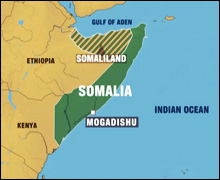 The Republic of Somaliland
The Republic of Somaliland
The Republic of Somaliland, located in north east Africa, has not been
recognised by any state since it declared independence from Somalia in
1991.
Despite its fragile status, Somaliland is in a territorial dispute with
Somalia, claiming the entire area of the former British Somaliland
protectorate. Meanwhile, the north eastern region of Maakhir has in turn
declared a separate, unrecognised autonomous state within Somalia.
Yet another separatist movement in the western Awdal province makes the
international recognition for either of them virtually unachievable. If
any of the breakaway regions is officially recognised, the whole of
Somalia will collapse like a house of cards.
Ex-Soviet republics: Transdniester
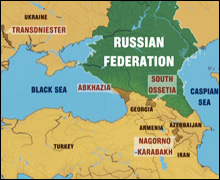 Abkhazia, South Ossetia, Nagorno-Karabakh
Abkhazia, South Ossetia, Nagorno-Karabakhand Transdniester |
Transdniester is located in a strip between the Dniester River and Ukraine.
After the dissolution of the USSR, Transdniester declared independence, leading to a four-month long conflict with Moldova. Although the ceasefire has held, the territory's political status remains unresolved, and Transdniester has been de facto independent since then.
Nagorno-Karabakh Republic
The Nagorno-Karabakh Republic, also known as the Artsakh Republic, is de facto independent, located about 270 km west of the Azerbaijani capital Baku, close to the border with Armenia.
The predominantly Armenian-populated region was long disputed between Armenia and Azerbaijan. However, while the Soviet Union had control over the area, the situation was relatively calm.
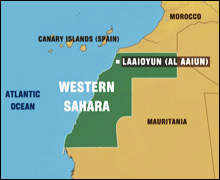 Sahrawi Arab Democratic Republic
Sahrawi Arab Democratic Republic |
On December 10, 1991, as the Soviet Union was collapsing, a referendum held in Nagorno-Karabakh and the neighboring Shahumian region resulted in a declaration of independence from Azerbaijan. Since the ceasefire in 1994, most of Nagorno-Karabakh, as well as a number of regions of Azerbaijan in close proximity, remain under joint Armenian and Nagorno-Karabakh military control.
Sahrawi Arab Democratic Republic
There is another group of countries which have been accepted as sovereign states by UN member-countries, but not by the UN itself. They therefore cannot be considered fully independent states.
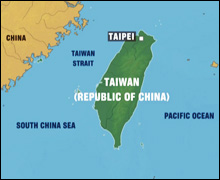 Taiwan
Taiwan |
Taipei, Taiwan
Taiwan – formed after the Chinese Civil War – has essentially been independent for half a century. But China still regards it as a rebel region which must be reunited. It only has diplomatic relations with around two dozen countries and lost its UN seat in 1971.
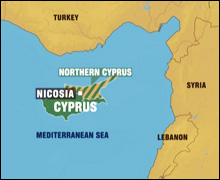 The Turkish Republic of Northern Cyprus
The Turkish Republic of Northern Cyprus |
The Turkish Republic of Northern Cyprus declared independence in 1983, nine years after a Greek Cypriot coup - which was attempting to annex the island to Greece - triggered an invasion by Turkey. Northern Cyprus has only been recognised by Turkey, on which it is fully dependent.
Palestinian Authority
Israel, whose own status is itself disputed by some of its neighbours, has a breakaway region of its own: The Palestinian National Authority.
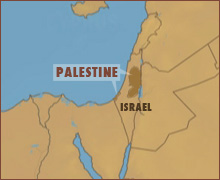 The Palestinian National Authority
The Palestinian National Authority |
However on Wednesday U.S. Secretary Condoleezza Rice stated that President Bush is ‘tireless advocate’ for establishment of Palestinian state.
Fair Use Notice
This site contains copyrighted material the use of which has not always been specifically authorized by the copyright owner. We are making such material available in our efforts to advance understanding of environmental, political, human rights, economic, democracy, scientific, and social justice issues, etc. We believe this constitutes a 'fair use' of any such copyrighted material as provided for in section 107 of the US Copyright Law. In accordance with Title 17 U.S.C. Section 107, the material on this site is distributed without profit to those who have expressed a prior interest in receiving the included information for research and educational purposes. For more information go to: http://www.law.cornell.edu/uscode/17/107.shtml. If you wish to use copyrighted material from this site for purposes of your own that go beyond 'fair use', you must obtain permission from the copyright owner.
|
|
|
|
||
|
||||||


